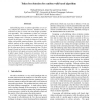Free Online Productivity Tools
i2Speak
i2Symbol
i2OCR
iTex2Img
iWeb2Print
iWeb2Shot
i2Type
iPdf2Split
iPdf2Merge
i2Bopomofo
i2Arabic
i2Style
i2Image
i2PDF
iLatex2Rtf
Sci2ools
104
click to vote
ISPDC
2008
IEEE
2008
IEEE
Token Loss Detection for Random Walk based Algorithm
Self-stabilizing token circulation algorithms are not always adapted for dynamic networks. Random walks are well known to play a crucial role in the design of randomized algorithms. The combination of these two concepts makes it possible to design a solution that is adaptive to topology changes and is tolerant to transient faults. Our purpose in this paper is to study the behavior of such algorithms with possible transient failures. We provide a probabilistic analysis of the waiting time. More precisely, we give two bounds on the probability for a processor to wait for the token more than a certain amount of time. The first bound is based on the token return time (the expected time for the token to visit again a processor) and the second one, a tighter upper bound, is based on its variance. Next, we characterize a local ”criterion of suspicion” for each processor to be in a faulty global configuration; in fact a token loss detection. Thanks to this criterion, we propose to refi...
Distributed And Parallel Computing | ISPDC 2008 | Random Walk | Self-stabilizing Token Circulation | Token Circulation Algorithm |
Related Content
| Added | 31 May 2010 |
| Updated | 31 May 2010 |
| Type | Conference |
| Year | 2008 |
| Where | ISPDC |
| Authors | Thibault Bernard, Alain Bui, Devan Sohier |
Comments (0)

